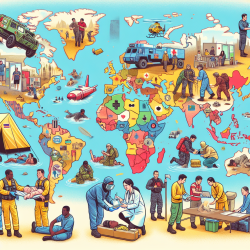In the realm of international disaster response and complex humanitarian emergencies (CHE), the competence of responders is critical. The ability to efficiently manage crises depends heavily on the skills and training that responders possess before deployment. A recent study titled "Availability and Diversity of Training Programs for Responders to International Disasters and Complex Humanitarian Emergencies" sheds light on various training programs available worldwide. This blog explores how practitioners can leverage these insights to enhance their skills and effectiveness in the field.
The Importance of Training Programs
Training programs are essential for preparing responders to face the challenges posed by international disasters. These programs not only equip individuals with necessary technical skills but also foster a deeper understanding of cultural sensitivities, security awareness, and mental health considerations. As the number of global disasters increases, so does the demand for well-trained professionals capable of delivering effective aid.
Diverse Training Opportunities
The research identifies 21 structured training programs designed for responders, each varying in objectives, target audiences, costs, and locations. Here are some key takeaways:
- Cost and Duration: Programs range from free to $2,400, with durations between 2 days to several weeks.
- Focus Areas: Some programs emphasize mental health aspects, while others focus on logistical and technical skills.
- Accessibility: Many programs are open to the public, although some require invitations or specific qualifications.
- Global Reach: Trainings are conducted in multiple locations worldwide, including Cuba and Australia.
Implementing Research Outcomes
Practitioners looking to improve their skills can benefit from this research in several ways:
- Identifying Suitable Programs: By understanding the diverse offerings, responders can select programs that align with their specific needs and career goals.
- Enhancing Cultural Competency: Training in different geographical locations provides exposure to varied cultures, enhancing a responder's ability to operate effectively in diverse environments.
- Focusing on Mental Health: Given the increasing focus on mental health in disaster scenarios, responders can choose programs that offer specialized training in psychological support.
- Pursuing Further Research: Encouraged by this study's insights, practitioners may engage in further research to identify additional training opportunities or develop new training modules tailored to emerging needs.
The Role of Online Therapy Services
As a provider of online therapy services like TinyEYE, understanding these training programs can also enhance service delivery. By collaborating with trained responders who possess a comprehensive understanding of mental health challenges in disaster settings, online therapy services can offer more targeted support to affected individuals.
Conclusion
The availability of diverse training programs provides a valuable resource for practitioners aiming to enhance their skills in international disaster response. By selecting appropriate programs and engaging in continuous learning, responders can significantly improve their effectiveness and contribute positively to humanitarian efforts worldwide. For those interested in exploring these opportunities further, accessing the original research paper is highly recommended.










